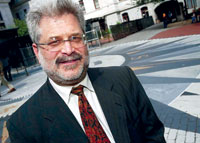|
 |
 |
COMMUNITY |
 Won't You
Be My Neighbor? Won't You
Be My Neighbor?
A new city
political organization finds inspiration in the last
presidential race. 
by Gwen
Shaffer

>During November's election more than 61
percent of registered voters in Philadelphia cast ballots at
the polls-the highest turnout since 1992. Many people
partially attribute the remarkable level of participation to
MoveOn, an advocacy group that mobilized voters around
so-called progressive issues in communities throughout the
country.
Now a group of local political activists hopes to harness
both the lingering momentum and this same base of folks who
organized in the months leading up to the last presidential
election.
The fledgling group Philly Neighborhood Networks will be
structured like Philadelphia's Democratic Party, with division
and ward leaders. But there will be one critical difference,
founders of the reform group insist.
Neighborhood Networks ward leaders won't support candidates
based on whether they give money to the leadership, and the
organization won't threaten to punish division leaders who
think independently.
"Neighborhood Networks will be a democracy in spirit as
well as form," says Marc Stier, a Temple University professor
and president of West Mt. Airy Neighbors. "We want to work to
help elect good candidates-ones who aren't in it for patronage
or jobs, but because they care."
Just as MoveOn recruited "precinct captains" to knock on
their neighbors' doors and talk politics, the founders of
Philly Neighborhood Networks hope their division leaders will
serve a similar role. The group's ward leaders, meanwhile,
will come together, possibly with some at-large members, to
form the steering committee.
"The biggest challenge is getting people to understand that
in order to have an impact on a national level, you need to be
energized on a local level," says Stan Shapiro, an attorney
who worked for Philadelphia City Council for many years.
Shapiro and a handful of other founders will officially
launch Neighborhood Networks at an organizing conference on
Sat., June 4. The daylong event will be held at the University
of Pennsylvania Law School.
The keynote speaker is Tom Hughes, executive director of
Democracy for America. That group evolved from Dean for
America, the grassroots force behind former Vermont Gov.
Howard Dean's 2004 bid for the White House.
The organizers of Neighborhood Networks say they envision
the group as a web of activists who can lend some time to
political campaigns, in support of both progressive candidates
for office and progressive policies.
"We care about good government," stresses Stier, who
unsuccessfully vied for a Pennsylvania House seat in last
year's Democratic primary. "We want elected officials who
don't give a $30 million tax break to a company like Comcast,
which earned a $1.9 billion profit last year."
Rather, Stier and his cohorts would like to see a local
Democratic Party that focuses on improving the quality of life
of low-income residents by pushing for changes such as
increasing the minimum wage and repairing abandoned homes.
Active members of Neighborhood Networks will be asked to go
door-to-door to find and talk up supporters of the policies
and candidates the group endorses, as well as solicit input
from these same residents. Members will also be encouraged to
send letters and emails, distribute literature and meet with
political officials.
Political activist Kathy Quinn says she got involved early
on because she sees a need to push the city's Democratic Party
toward more progressive issues.
"This is not about challenging the party or pushing
third-party candidates," she says. "It's about soliciting more
input on issues like campaign finance reform and mass
transit."
Specific issues to focus on will be determined during next
week's conference, and later by the membership. However, the
Neighborhood Networks website does make reference to pushing
for new ethics rules in Philadelphia government and limiting
gun sales statewide. On a national level, the organization
could get involved in protecting Social Security, and
defeating "judicial nominees who are right-wing extremists,"
according to the website.
Local attorney Hal Rosenthal has been involved in several
previous political reform movements. After the 1968 Democratic
National Convention in Chicago, he helped organize the New
Democratic Coalition, which tried to "reinvigorate the party
from within," he says.
Rosenthal says he's watched most political activists over
the decades treat democracy as if they were "volunteer
firefighters."
"If there was a fire, they'd fight it," he says. "But
people need to stay involved."
Rosenthal-who served as a Democratic committeeman in
Northeast Philadelphia for 16 years-says he's optimistic about
Philly Neighborhood Networks. "Because for the first time in
15 years, I see young people staying involved ?#128;? The party
needs to be revived from the ground up."
Stier adds that Philly Neighborhood Networks is not looking
to "take over" the party. "But if we could organize about 500
people who could each bring in 100 votes for progressive
candidates, we could dramatically change the system."
Gwen Shaffer (gshaffer@philadelphiaweekly.com)
last wrote about a forthcoming audit of Philadelphia's
faltering recycling program.
| 
